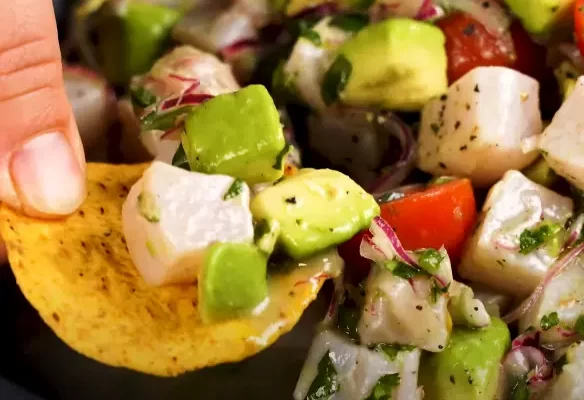Many people from different parts of the world enjoy ceviche, a renowned dish comprising of raw fish or seafood soaked in citrus juice. Its distinct method of preparation and refreshing taste make it a culinary pleasure. Nonetheless, it is important to consider if there are any potential health risks associated with consuming ceviche on a daily basis.
This article will investigate the possible impact on your wellbeing and whether moderating your intake is essential.
Nutritional Benefits of Ceviche
Ceviche is traditionally made by using fresh seafood or fish, like shrimp, octopus, or squid. These ingredients are known for their high content of lean protein, omega-3 fatty acids, and important minerals such as iodine, selenium, and vitamin D. The inclusion of citrus juice in the marinade provides a boost of vitamin C and antioxidants.
Nutritional Facts of a Single Portion of Ceviche
| Nutrient | Amount |
|---|---|
| Calories | 150 |
| Total Fat | 2 g |
| Saturated Fat | 0.5 g |
| Trans Fat | 0 g |
| Cholesterol | 80 mg |
| Sodium | 480 mg |
| Total Carbohydrate | 13 g |
| Dietary Fiber | 2 g |
| Sugars | 7 g |
| Protein | 24 g |
| Vitamin A | 15% Daily Value |
| Vitamin C | 55% Daily Value |
| Calcium | 5% Daily Value |
| Iron | 5% Daily Value |
Moderation is Crucial
While ceviche can be a healthy addition to your diet, it is important to consume it in moderation. Eating anything in excess can have adverse effects on your health. Here are a few factors to consider:
- Raw Fish and Seafood: Raw seafood in ceviche may contain bacteria, parasites, or viruses that can cause foodborne illnesses if not handled or prepared properly. Regularly consuming raw seafood can increase the risk of infections, especially for pregnant women, people with compromised immune systems, or those with digestive issues.
- Sodium Content: The marinade in ceviche often includes salt, which may contribute to increased sodium intake. Overconsumption of sodium has been linked to high blood pressure and an increased risk of cardiovascular problems. Those with hypertension or kidney issues should be cautious about their sodium intake and consider portion control.
- Mercury Levels: Some fish used in ceviche, such as swordfish, king mackerel, and tilefish, may contain higher levels of mercury. Mercury is a toxic metal that can accumulate in the body over time and negatively impact the nervous system. It is advisable to choose fish with lower mercury levels, like salmon or trout, and limit consumption to prevent mercury toxicity.
Conclusion
While ceviche can be a delicious and nutritious dish, it is important to exercise moderation when consuming it regularly. The raw nature of the seafood and potential risks associated with raw fish, sodium, and mercury levels must be taken into account. If you enjoy ceviche, diversify your diet and incorporate other healthy options to maintain a balanced nutrient intake.
Remember, it’s all about balance and making informed choices to ensure optimal health









